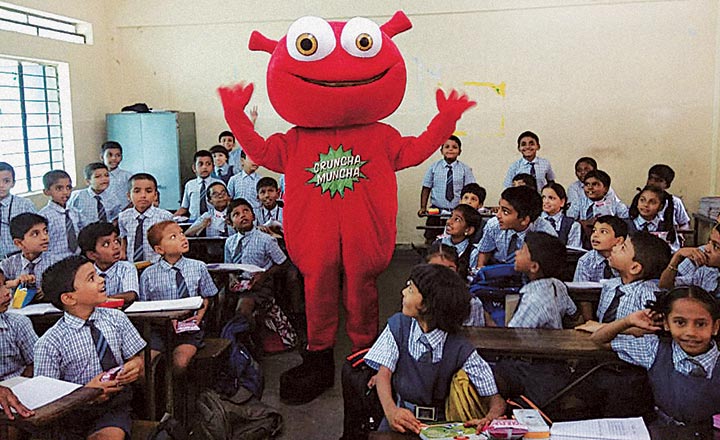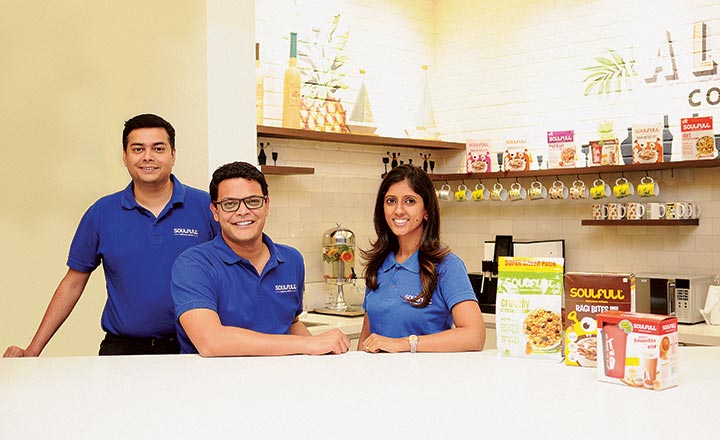How often do we skip a meal or grab something unhealthy but convenient while rushing to work? Bengaluru-based Kottaram Agro Foods, under the brand Soulfull, has an alternative. Grab the instant Smoothix in almond flavour or snack on some Ragi Bites on your way. Better yet, switch from your rice and wheat breakfast to healthier Ragi Flakes.
The start-up co-founder Prashant Parameswaran first found inspiration in the “superfood” of the West — quinoa — while he was working in the US in 2005. “It begged the question, why can’t we do something with the many ancient grains of India,” says the 39-year-old. After he returned to India in 2009 “in pursuit of these ancient grains”, he started researching.
Making it happen
The founding team of Amith Sebastian (40), Rasika Iyer (35) and Parameswaran came together with friends and family to pool in around Rs.250 million to launch the brand in 2011. Parameswaran cites renowned geneticist MS Swaminathan, who is incidentally related to him, as an inspiration. The launch of Soulfull was held at the MS Swaminathan Research Foundation in Chennai.
The trio assigned themselves definitive roles, with Parameswaran focusing on ideation and product development, Iyer looking at marketing, and Sebastian looking at operations and sales. “The first two to three years were spent determining the right set of products,” says Parameswaran. They sought the help of research institutions such as the Indian Institute of Millets Research (IIMR) to understand how they could add value to the grain and International Crops Research Institute for the Semi-Arid Tropics (ICRISAT) in Hyderabad to gauge market opportunities. Agricultural experts and food technologists from the Central Food Technological Research Institute (CFTRI) in Mysuru helped them engineer machines and put together processes for the final production.

One of the first challenges they tackled was making millets relevant in the 21st century. “It was not just about taking these millets, putting them in small pouches and asking people to go ahead and buy them,” says Parameswaran. After giving it much thought, they decided to start with ragi (finger millets). It is usually the first grain prescribed by doctors and family members, and thus bears their stamp of approval.
This led to the launch of their product Ragi Bites in 2013, for “kids and the adults who refuse to grow up”. While ragi is rich in calcium, potassium, phosphorous and iron, it is low in protein and therefore, dal (another hat tip to tradition) was added to the mix. The ragi-dal breakfast cereal and snack was then given a gooey chocolate, strawberry and vanilla-flavoured centre. “The filling is only a dollop and not a bucket load,” says Parameswaran. Soulfull products were first made available to the public in Bengaluru, at HyperCity’s Whitefield outlet. Currently, their products are available in 13,000 stores across 25 Indian cities including Delhi-NCR region (largest market accounting for 30%), Mumbai, Chennai, Kolkata, Pune, Lucknow and Dehradun. The products are also sold online through e-commerce platforms such as Amazon, Flipkart and Bigbasket. In FY19, the company clocked revenue of about Rs.250 million, and this fiscal, when they plan to scale up to 30,000 stores, they expect to post Rs.500 million.
Winning over tastebuds
Millets are not palatable to consumers and Soulfull has tried some clever tricks to win them over. While coming out with the Ragi Bites cereal, the team worked on a muesli line and brought it out in three different variants — crunchy, diet and fruit and nut — in 2016. In this, they gradually increased the millet content from 3%, then 10% and now they have varieties that are wholly millet. In 2018, to cater to a diehard Indian palette, they even launched a chatpata version called Desi Muesli.
Vilas Tonapi, director of IIMR, has been associated with the start-up for nearly a decade and is proud of the results. “Prashant and team are the first generation of entrepreneurs to have benefitted from the know-how of millets,” he says. This research-led conception of Soulfull is what makes the brand stand out in the market today. “The company’s work with us has given it an understanding of grains and its processing. How well the grain has been processed decides its nutrition level,” explains Tonapi. This is how Parameswaran realised the inadequacy of the existing wheat machinery when it came to millets. He redesigned it, to ensure that none of the benefits of millets were lost.
The team also wanted to stay clear of artificial preservatives. So, for one and half years, they experimented with natural preservatives with the help of companies, including the Kerala-based Synthite. Trying to figure out which of the preservatives worked well with their chosen millet was essentially a shot in the dark. One more year was spent on choosing the right packaging material — crucial in this case due to the absence of preservatives.
“We carried out stability tests to see how the product would fare in the real world,” says Parameswaran. For this, they put together an in-house R&D team of three. Thanks to its pre-launch preparation, Soulfull has the shortest time to market from ideation to launch among packaged food companies. It takes just nine months while others take twice that, says Parameswaran.
The company now has a manufacturing unit in Bidadi, near Bengaluru, set up for Rs.50 million, from the Rs.350 million investment made by Aavishkaar Bharat Fund in 2018. Janavi Papriwal, investment manager at the firm that supports early-stage ventures, says, “The large, working urban population wants to try new products to suit their changing lifestyle, which is proving to be a challenge for legacy brands.” Aavishkaar joined Soulfull’s board the year they made the investment.
Papriwal adds, “Because of its focus on processing traditional Indian grains, Soulfull has the potential to create immense monetary impact on the lives of the farmers who grow these hardy crops that require minimal water and other agricultural inputs.”
Working in a sector with many vulnerable agriculturists, Soulfull is aware of its social responsibility, and meets it too. The DIPP-recognised start-up sources around 200 tonne of ragi and foxtail millet annually, directly from farmers in North Karnataka. Parameswaran states that the company chose Bengaluru as its base of operations because 65% of India’s ragi produce comes from this state. “Agro-scientists from the Indian Council of Agricultural Research helped us identify clusters where ragi is grown. Even today, we source from the same clusters,” he says.
The Soulfull team also goes to schools and housing societies to educate children about how consuming ragi can help conserve water. It is not unlikely that one might meet the Cruncha Muncha warriors (Ragi Bites mascot) while out in a park.
Picking sides
The start-up’s product line looks like it has neatly tied up two ends — of a farmer struggling to get a reasonable return for his produce, and of the office-goer hurrying to reach work on time. Things are expected to go smoothly then. But, breakfast cereal is only consumed by 12% of the Indian population. According to data by Statista, the revenue of the breakfast cereal segment in India is estimated at $1.18 billion in CY19, and the market is expected to grow at 4.6% CAGR till 2023. This is small compared to the estimated revenue of $60.45 billion from the global market in the same year.
Yet, there are many fighting over this small pie. Companies are selling cereals in packages of different shapes and sizes — from granola bars to muesli and oats. “The cereal market is cluttered, and every brand out there is doing its bit to cater to the changing needs of consumers,” says Parameswaran.
Ankur Bisen, senior VP at Technopak, concurs. However, he believes the breakfast market is not restricted to a few items; it spans everything from ready-to-cook upma to cornflakes and bread and jam. Thus, there is huge opportunity for companies despite high competition. “Companies are trying to cater to either the health or convenience criteria, or both. Thus, while Soulfull is trying to win the health platform, established packaged food companies such as Kellogg’s and MTR are looking at convenience,” he says.
Soulfull faces an additional challenge — of establishing an identity for itself. “The company, with its Bites and Fills ranges has managed to get attractive and similar large-sized carton packaging as the category leader Kellogg’s, however the challenge will be to get adequate shelf space and stand out for the customers to pick their pack,” says industry veteran KS Narayanan, former president - seasonings and flavors, VKL Seasoning.
What has worked in the company’s favour though, is the ‘healthy eating’ trend catching on in the country since 2012-13. “Conssumers today are increasingly becoming conscious of what they eat,” says Bisen. The ‘lack of time’ for most consumers is another growth driver for this space, adds Narayanan. “The idea of healthy eating, coupled with limited time to have breakfasts as whole meals, has spurred growth in this section,” he explains.
Parameswaran remains optimistic. Soulfull’s target customer, he says, is the health conscious and upwardly mobile Indian consumer. The product range, designed to net all age groups, has been positioned as mid-premium. “Our products, on an average, would command 5% more premium than competition,” he says. “We don’t want to be positioned as a ‘me too’ brand playing on undercutting prices to gain market share. We are confident that consumers are ready to pay a little premium if the best offering is provided to them,” he adds.
Papriwal backs him, saying, “Soulfull has done extremely well over the past couple of years and Aavishkaar is confident that it will continue on its growth trajectory. While Soulfull plays in the mid-price category, thereby targeting a very large market base, the positioning created by it is sharp. We expect the company to double its revenue every year for the next few years at least.”
She believes that Soulfull is in a category of its own. “There is no single home-grown healthy food brand that offers taste, convenience and affordability in multiple forms and across specific demographic groups.”
So, what’s next? Parameswaran says more in the kids snacking range and drinks. More interestingly, he believes cereal makers must look beyond breakfast and target consumption occasions during the day. Maybe, buyers could be convinced to try a bowl of Ragi Bites for their movie night on a Friday (instead of that butter popcorn) or munch on a bowl of banana-flavoured Ragi Flakes while gossiping over tea. Let’s raise a Cocoalite Smoothix toast to that!











